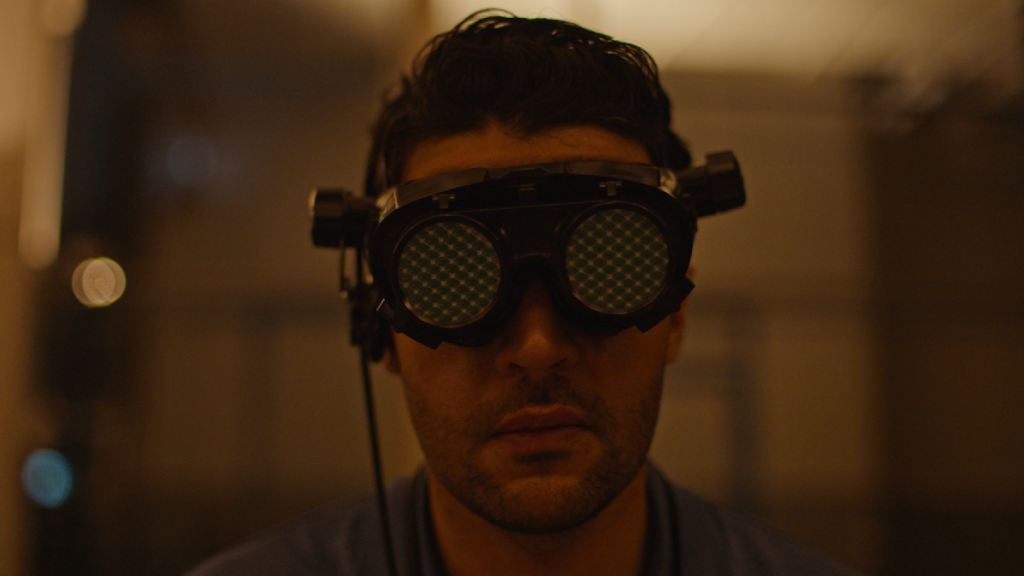In a world where the sordid inhumanity of corporate dealings has become literalised in transactions of murder and blood, Tasya Vos (Andrea Riseborough) is a paid agent who assassinates targets for a shady unnamed company. In a comfortable chair of white leather, scientists perform a process on her that allows her to access other people’s minds. She kills through them, providing both a motive and a way out.
The murder-suicide that begins Brandon Cronenberg’s latest film, Possessor, is instantly compelling. We see spiralling tracking shots of the killer lit up by bold, colourful backgrounds and neon lights. Encompassing her perspective, each brutally visceral attack is punctuated by unflinching visions of blood spurting and tainting the objects around it. In terms of point of view, the rest of the narrative is far less clear cut.
As Tasya takes on a new hit, which involves entering a man’s body in order to kill his future father-in-law, her already flimsy sense of identity begins to crumble and merge with this other figure. What was meant to be simple becomes fractured by strange hallucinations and intrusions of the possessed man. Outside of this psychological horror, there is also an inherent fear engendered into the audience by the fact that we cannot control her either.
LFF Review: Another Round / Druk (Thomas Vinterberg)
Ways that she decides to murder people seem increasingly gratuitous, and there are some really nasty and engrossing moments that make the most of this detachment from her. Riseborough’s unassuming and elliptical performance emphasises this, but also makes the tension of her home life less emotionally engaging. Will she ever return? Does she even care? Some of the great mysteries of the film may just be slightly undercooked.
On the other hand, something that is absolutely brilliant about Possessor is the amount of interesting threads that it manages to weave into its high concept premise. Like many body-horror films, such as those of the director’s father David Cronenberg, it is generally concerned with the loss of identity. Yet, it also contains an urgent and visceral critique of corporatism as well as beautiful, nuanced images that explore memory, sexuality, and gender.
Additionally, Tasya’s takeover of Colin Tate (Christopher Abbott) becomes a challenge and a powerful motif in less brutal ways. She must interact with his girlfriend without confusing her. She has to feign intimacy and discover the idiosyncrasies of these lives that she is about to destroy. Riseborough and Tate both excel in these (almost) dual roles, anchored by intoxicating and surreal visual effects blending them together.
LFF Review: Zanka Contact (Ismaël El Iraki)
Performances across the board are stellar. Jennifer Jason Leigh and Sean Bean are particularly delightful playing garishly Machiavellian roles, though no-one is kind in this world. It’s a monotonous, severe environment that is only marginally futuristic. Cronenberg leaves many of the science fiction aspects (aside from the central device) ambiguous. These things become more uncomfortable through the character’s comfort, with what they have allowed to become normal.
The audience become implicit in this critique, as suggested by the use of “future” technologies that exist now, like when Colin, employed at Sean Bean’s firm to collect information on people through their webcams, stares at them in virtual reality. Due to the fact that everyone is so universally horrible, the movie becomes infinitely more intriguing as an exercise in style than emotion. This is probably by design.
Sometimes, the generally great camerawork seems to lean into the more dull aspects of this subject, gently tracking away from odd scenes or repeatedly focusing on distraught, disorientated characters. Indeed, a little bit of steam seems to be lost by the time of the third act, when the conflict is dictated more by Colin trying to excavate Tasya from his mind than by her struggling to complete her mission.
LFF Review: David Byrne’s American Utopia (Spike Lee)
Perhaps it’s shallow, but I far more enjoyed the aspects that explored what it means to be trapped in someone else’s body as well as what it means to commit acts of violence. When the playing field is levelled, it becomes a less interesting tug of war between two rather plain protagonists. What I loved was the horror of acting through someone, of using and being used by this dynamic.
Ultimately, what Cronenberg gets right, and this is of paramount importance, is an understanding of the metaphorical and symbolic potential of tangible bodies. There is also a brilliant, unrelenting portrayal of things like hurting people and having sex in this mode, which prompts a myriad of questions about agency, desire, and how we perceive reality. This ambition makes Possessor a standout horror that fortunately never holds back.

